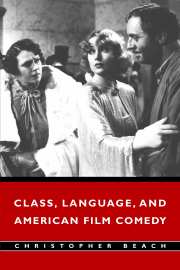Book contents
- Frontmatter
- Contents
- Acknowledgments
- Introduction
- 1 A Troubled Paradise: Utopia and Transgression in Comedies of the Early 1930s
- 2 Working Ladies and Forgotten Men: Class Divisions in Romantic Comedy, 1934–1937
- 3 “The Split-Pea Soup and the Succotash”: Frank Capra's 1930s Comedies and the Subject of Class
- 4 Is Class Necessary?: Preston Sturges and Howard Hawks in the Early 1940s
- 5 Desperately Seeking Status: Class, Gender, and Social Anxiety in Postwar Hollywood Comedy
- 6 Is There a Class in This Text?: Woody Allen and Postmodern Comedy
- 7 Yuppies and Other Strangers: Class Satire and Cultural Clash in Contemporary Film Comedy
- Notes
- Works Cited
- Index
2 - Working Ladies and Forgotten Men: Class Divisions in Romantic Comedy, 1934–1937
Published online by Cambridge University Press: 02 December 2009
- Frontmatter
- Contents
- Acknowledgments
- Introduction
- 1 A Troubled Paradise: Utopia and Transgression in Comedies of the Early 1930s
- 2 Working Ladies and Forgotten Men: Class Divisions in Romantic Comedy, 1934–1937
- 3 “The Split-Pea Soup and the Succotash”: Frank Capra's 1930s Comedies and the Subject of Class
- 4 Is Class Necessary?: Preston Sturges and Howard Hawks in the Early 1940s
- 5 Desperately Seeking Status: Class, Gender, and Social Anxiety in Postwar Hollywood Comedy
- 6 Is There a Class in This Text?: Woody Allen and Postmodern Comedy
- 7 Yuppies and Other Strangers: Class Satire and Cultural Clash in Contemporary Film Comedy
- Notes
- Works Cited
- Index
Summary
If films like the Marx Brothers' Animal Crackers made clear the object of their social satire, many of the comedies made later in the decade – including the romantic “screwball comedies” by directors such as Gregory La Cava, Mitchell Leisen, and Leo McCarey – were far more equivocal in their treatment of class and other social issues. La Cava's My Man Godfrey (1936), for example, begins with a satire on upper-class society that seems equal in its subversive potential to the most anarchic comedies of the Marx Brothers, yet it ends with an unexpected and rather sudden reversal of its underlying social critique.
The film begins when two wealthy young women – Irene Bullock (Carole Lombard) and her sister Cornelia (Gail Patrick) – discover the apparently destitute Godfrey Parke (William Powell) among the homeless men living on the city dump, bring him as their “forgotten man” to a scavenger hunt party at the “Waldorf Ritz,” and subsequently hire him as the family butler. Throughout most of the film, La Cava's satirical lens is directed toward the screwball antics of the conspicuously pampered upper classes, as we witness the total lack of sensitivity displayed by upper-class characters toward the situation of their less privileged counterparts. When Irene first encounters Godfrey at the dump, she fatuously asks him why he lives in such a place when there are so many nicer homes. Irene appears not even to have registered the fact of the Depression, and the Bullock family as a whole retains a pre-crash mentality in the midst of the Depression era.
- Type
- Chapter
- Information
- Class, Language, and American Film Comedy , pp. 47 - 66Publisher: Cambridge University PressPrint publication year: 2002



